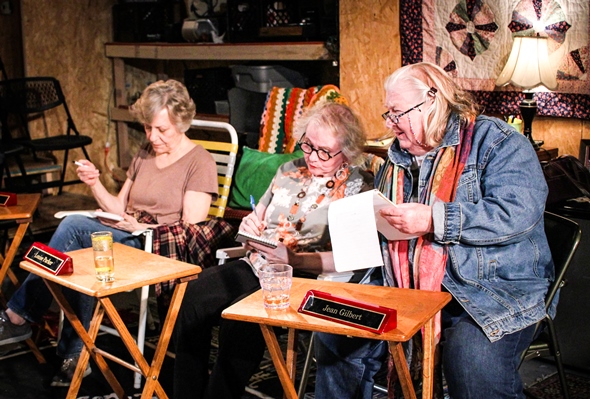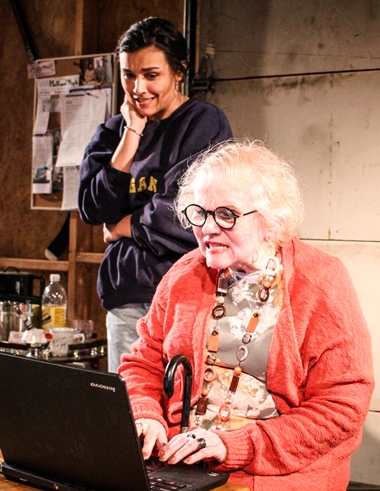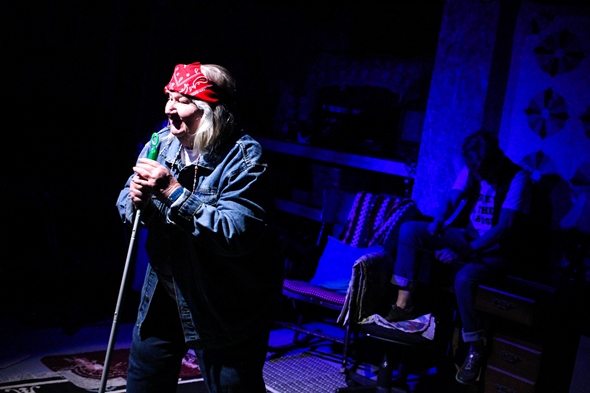‘Herland’ at Redtwist: Three senior ladies give new meaning to garage band’s sacred domain

Comparing notes for their perfect retirement home: Terry (Valerie Gorman, left), Louise (marssie Mencotti) and Jean (Kathleen Ruhl). (Production photos by Gracie Meier)
“Herland” by Grace McLeod, directed by James Fleming at Redtwist Theatre through April 14. ★★★
By Lawrence B. Johnson
As shaggy dog stories go, Grace McLeod’s “Herland,” now rollicking about in the very small space of Redtwist Theatre, is funny from start almost to finish. The show derives its nearly nonstop energy and substantial appeal from three middle-aged actresses and a convincingly vulnerable young actress playing in a you-are-there garage set. Right at the finish line, however, “Herland” makes a sudden shift from high comedy to self-conscious morality tale and concludes in an awkward effort to make its point.

Natalie (Simran Bal) signs on as an intern — that means she doesn’t get paid — to help Jean (Kathleen Ruhl) with her retirement project.
The garage belongs to Jean (Kathleen Ruhl). Not long before, it was the inviolable domain of Jean’s ex-husband and the guys in his Bruce Springsteen cover band. Jean wasn’t even allowed to enter. But now it’s hers, and she practically lives there. The garage is her office and command center for a visionary project: to transform her home into a retirement residence for herself and her two best friends. To facilitate this makeover, Jean hires a girl just out of high school as summer intern, an essential category of labor that means she doesn’t have to pay the girl.
But the eager candidate, Natalie (Simran Bal), is fine with that. She’s a bright, curious, multitalented kid about to begin studies at the University of Michigan, and she’s happy enough just to gain the experience – and to be able to add the job to her resume. Jean has never hired anyone before, never conducted an interview. This one is a hoot, and of course it ends with Natalie getting the job.
Jean and her two pals, Terry (Valerie Gorman) and Louise (marssie Mencotti), have been friends forever. They’re the three musketeers, one for all, etc. They know everything about each other. Like Jean, Terry was once married. That didn’t work out in part because she’s a lesbian. Louise has always been single, for her own reason. Their contrasting personalities cover the map: Louise is an imp with an expansive sense of humor that can border on the abrasive. Terry is quiet, serious. Jean’s very active wit tends to the droll side.
The three actresses create a comic brew that floods the tiny venue. Mencotti’s sly, mischievous Louise is a sparkplug of irresistible esprit. As the play progresses, you find yourself looking to this spunky, self-assured woman with the (thinning) curly blond hair in expectation of what she will say next. And yet it is Ruhl’s jolly, understated but all-embracing Jean who dominates the room. They make a delightful pair. Gorman’s Terry is – I don’t know how else to put this – their straight man.
Plunk into the middle of their well-conditioned banter drops Bal’s sweet, eager, innocent and very capable Natalie. Besides being just plain smart, Natalie has every young person’s fluency on the internet. Bal adroitly keeps Natalie aloft on a tightrope between deference to three women who could be her great-aunts and taking initiatives to help push the retirement project toward fruition. The three old gals love her. Who wouldn’t?
Love, or anyway sex and sexual orientation, resonates as the play’s essential subtext. Natalie is grappling with her sexuality; in the midst of things, the playwright gives us a fairly explicit (or perhaps strongly implicit) lesbian sex scene between Natalie and a one-time visitor, who from a structural standpoint seems to have been dragged in by scruff of the neck. We see Natalie’s uncertainty; what we do not see, what the playwright doesn’t quite rise to the challenge of addressing, is the psychological hurdle that’s blocking her.
One of the show’s best scenes, played to the nines here, is a dream Natalie has of the three senior citizens rocking out on a Springsteen tune, each clutching a makeshift instrument – with Jean as lead singer on broom-handle mike, her head wrapped in a red bandanna – and all bathed in deep blue light. Yet one more example of how plays in Redtwist’s super-compact space feel like participatory events. And kudos to lighting designer Shelbi Arndt for imaginative effects throughout.
I can’t say the fun really takes us anywhere. The laughs end before the play does, and Natalie has a moment that lands us perhaps in a coming of age story, even if that’s not quite where we began. Thus the title “Herland” – a utopian feminist community – might take on the double meaning of Natalie’s world awakening. As theater, the denouement lacks the crisp snap that marks both the frame and dialogue of the core of the play.
Set designer Alyssa Mohn’s redecorated garage is a piece of work. It has all the necessities: a full-scale door on a sliding track, a stereo, a boxful of the Boss’ records and a properly stocked bar. The old girls do keep their glasses freshened.
Related Links:
- Performance location, dates and times: Details at TheatreInChicago.com
Tags: Grace McLeod, Herland, Kathleen Ruhl, marssie Mencotti, Redtwist, Shelbi Arndt, Simran Bal, Valerie Gorman



